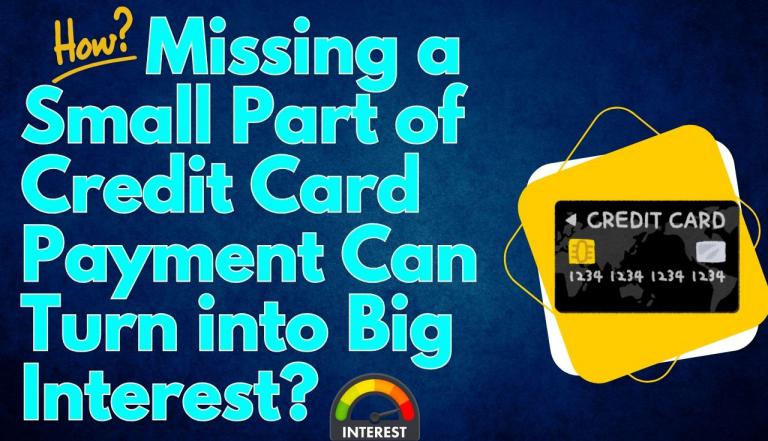How Missing a Small Part of Credit Card Payment Can Turn into Big Interest?
By Team CodeForBanks | August 16, 2025



Credit cards offer convenience, rewards, and short-term credit but they also come with a catch. According to the Reserve Bank of India, the average interest rate on credit card debt ranges from 30% to 42% annually, depending on the issuer. That is 2.5% to 3.5% per month, which can snowball quickly if you are not careful.
Many cardholders believe that paying the minimum amount due or even most of the bill is enough to avoid interest. But missing even a small portion of your payment can result in interest on the entire outstanding balance, not just the unpaid part.

What is Credit Card Billing Cycle?
Before diving into the consequences, it is important to understand how credit card billing works:
- Billing Cycle: Usually 30 days, during which your purchases are recorded.
- Due Date: The date by which you must pay your bill.
- Grace Period: If you pay the full amount by the due date, you enjoy interest-free credit.
If you pay even Re.1 less than the total due, you lose the grace period and interest is charged on all purchases, not just the unpaid amount.
What Happens When You Miss a Small Part of your Credit Card Bill?
We will check now partial credit card payment consequences. Suppose your total bill is Rs.20,000 and you pay Rs.19,500. That Rs.500 shortfall can cause interest on the entire Rs.20,000, and possibly on new purchases too.
| Month | Total Due | Amount Paid | Interest Charged | New Purchases | Total Outstanding |
|---|---|---|---|---|---|
| April | 20000 | 19500 | Rs.600 (approx) | 5000 | 25100 |
| May | 25100 | 10000 | Rs.1,200 (approx) | 3000 | 19100 |
Even though you paid most of the bill, the unpaid Rs.500 caused interest on the full amount and new purchases. Over time, this compounds into a much larger debt.
You may also like "Why Your Prepaid Card Will Not Help in Building Your Credit Score?"
Effect of Compounding Interest
Credit card interest charges are compounded daily which means the longer you delay full payment, the faster your debt grows. Missing small amounts repeatedly can lead to:
- Loss of grace period
- Interest on new purchases
- Late payment fees
- Reduced credit score
Minimum Payment Trap
Paying only the minimum amount due may seem like a relief, but it is a trap. It keeps your account active but barely reduces your principal. Here's how long it can take to pay off a Rs.20,000 balance if you only pay the minimum:
| Monthly Payment | Time to Pay Off | Total Interest Paid |
|---|---|---|
| 1000 | ~30 months | Rs.10,000 |
| 2000 | ~12 months | Rs.4,000 |
Ramesh, a salaried person, missed Rs.800 from his Rs.25,000 credit card bill. He assumed it was no big deal. But over the next 3 months, he noticed:
- Rs.2,400 in interest charges
- Rs.500 in late fees
- Rs.3,000 added to his balance from new purchases
He ended up paying Rs.5,900, all because of a small oversight. This is how credit card interest works.
How to Avoid This Mistake?
Here are some smart strategies to avoid credit card debt and avoid turning small misses into big interest:
- Always pay the full amount due before the due date
- Set up auto-pay for full payment
- Track your spending to avoid surprises
- Avoid using your card if you cannot pay in full
- Use EMI options for large purchases instead of revolving credit
Know Your Billing Cycle
If your billing cycle ends on the 25th and your due date is the 10th of the next month, purchases made on the 26th will give you nearly 45 days of interest-free credit but only if you pay your full bill on time.
Credit cards are powerful tools—but they demand discipline. Missing even a small portion of your payment can lead to interest on the full amount, loss of grace period, and compounding debt. The best way to stay ahead is to pay your full bill on time, every time.
Recent article "Why You Need to Check Your Credit Score Before You Apply for a Car Loan?"
More Latest Articles
-
5 Key Benefits of HSBC Live Plus Credit Card

-
Amazon Pay and ICICI Bank Strengthen Ties to Boost Co-Branded Credit Card

-
Best Senior Citizens Credit Cards in India for 2025

-
Gold Loan May Solve Your One Crisis but Could Create Another

-
How Can You Avoid Paying a Credit Card Annual Fee?

-
How Taxes Work on Mutual Fund Gains?

-
How to Change Your Credit Card Due Date in Minutes?

-
Should You opt for Zero Down Payment Two-Wheeler Loan?

-
Should You Rely on Mobile Apps for Availing Personal Loans?

-
Various Services You Can Access Through ATMs

Upcoming Bank Holidays
- 📅 2025 September 29 is a bank holiday in Andaman And Nicobar Island due to Durga Puja/Dussehra (Maha Saptami).
- 📅 2025 September 30 is a bank holiday in Andaman And Nicobar Island due to Dusshera (Mahashtami/Mahanavami)/Ayudha Pooja/Durga Puja (Dasain)/Durga Ashtami.
- 📅 2025 September 30 is a bank holiday in Sikkim due to Durga Puja (Dasain).
- 📅 2025 October 01 is a bank holiday in Andaman And Nicobar Island due to Dasara/Dussehra (Mahanavami/Vijayadashmi)/Durga Puja (Dasain).
- 📅 2025 October 02 is a bank holiday in Andaman And Nicobar Island due to Mahatma Gandhi Jayanti/Mahalaya Amavasye.
- 📅 2025 October 06 is a bank holiday in Andaman And Nicobar Island due to Lakshmi Puja.
- 📅 2025 October 07 is a bank holiday in Arunachal Pradesh due to Maharshi Valmiki Jayanti/Kati Bihu.




















